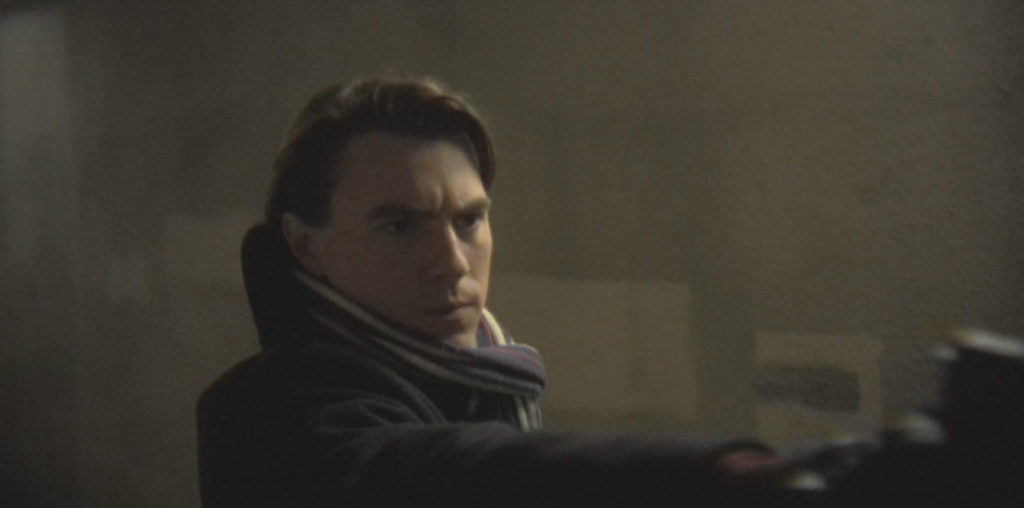
Shortly after James Cameron’s Titanic chewed up the record books in 1997 and 1998, my mother-in-law bought me a T-shirt with the phrase “THE BOAT SANK. GET OVER IT.” printed on it in bolted steel letters like the lettering of the movie title. Sometimes I wonder if I should pack this shirt up and mail it to James Cameron.
To say that Cameron has a Titanic obsession is as much an understatement as saying Iraqi Information Minister Mohammed Saeed al-Sahhaf has a small problem with factual accuracy. More of an educational documentary than a narrative feature, “Ghosts of the Abyss” follows Cameron, his long time buddy Bill Paxton and a slew of Titanic experts to the middle of the North Atlantic for a new journey more than 12,000 feet below the surface.
Paxton was brought along partly because he played the treasure hunter who was raiding Titanic in the 1997 film, but also to provide a layman’s view of the entire expedition. Paxton narrates some rather pretentious dialogue that really could have been left out. In one scene, we see him writing in a journal and we get the sense that this is where much of this forced poetry comes from, going to show us that Paxton probably shouldn’t quit his acting career for a writing career anytime soon.
Still, Paxton is refreshing in the film, considering that everyone else (including Cameron) is so knowledgeable about the legendary ocean liner that the audience would be otherwise left in the dust. In fact, there is one hysterical moment when Paxton launches into an interview in the flavor of the “Chris Farley Show” sketch on Saturday Night Live. What’s even funnier is the reaction of the sub technician who is spending several hours with Paxton and the cameraman locked in a space the size of a New York City apartment bathroom.
The only way to experience this film is on the IMAX big screen, and I’m not sure if there will ever be any other way to see it. The power comes from the near-perfect immersion technology that IMAX uses. It’s not just the size of the screen (some 6 stories tall) or the meticulous surround-sound speaker system. The real kicker of “Ghosts of the Abyss” is the 3-D experience.
Anyone who has not experienced an IMAX 3-D experience is missing out. This is not your father’s 3-D. The technology has come a long way from red and green plastic glasses that still showed double vision in films like “The Creature From the Black Lagoon” and “It Came From Outer Space.” IMAX uses specially designed liquid crystal lenses and polarized light to almost completely eliminate ghost images. The result is a crisp, clear picture that rivals the real perspective of being there.
Periodically, scenes flash back to ghost images of Titanic passengers and crew, shot as separate 3-D elements in the film. For the sinking scenes, clips from the 2-D film Titanic are shown and are pretty well disguised into the 3-D print. Don’t look for any familiar faces in the ghosts, though. Apparently, it wasn’t in the cards to get Kathy Bates or any of the original cast to reprise their roles.
Some interesting history can be learned in the film as we get a tiny glimpse into the lives of some of those involved – and some responsible, such as the financier who vetoed extra lifeboats for the ship, yet managed to hop aboard one himself before the ship went under.
Cameron spends plenty of time trying to right some wrongs in this film as well. In 1997’s Titanic, First Mate William Murdoch takes a bribe, shoots a passenger, then commits suicide while trying to control the crowds at the lifeboats. The real life Murdoch did not do this. In fact, he stuck it out to the bitter end and lost his life when the boat sank. Cameron faced an irate family of this hero when his film went on to gross close to $2 billion. While 20th Century Fox donated $8,500 to Murdoch’s hometown in Dalbeattie, Scotland, Cameron (who wrote the cowardly actions into the script) has largely remained silent. Now, he takes his chance with “Ghosts of the Abyss” eagerly (almost too eagerly) pointing out Murdoch’s heroic deeds and crediting him with saving at least two thirds of the passengers.
“Ghosts of the Abyss” was filmed in 2001, and one segment catches the crew’s reaction to the terrorist attack on September 11, which had a death toll that doubled that of Titanic. Several interesting parallels are drawn between these more recent events and the sinking of the Titanic almost 90 years before.
Part of what makes this film a must-see for Titanic fans is that it truly puts you closer to the wreckage than anyone else can get – even the folks who make the dives into the ocean. Watching from a submersible will physically get you closer, but you’re still encased in several inches of steel and glass. With “Ghosts of the Abyss,” you have the point of view of the underwater cameras mounted on the outside of the submersibles. You literally can look, unobscured, at the behemoth wreck. And that’s a pretty amazing sight.
